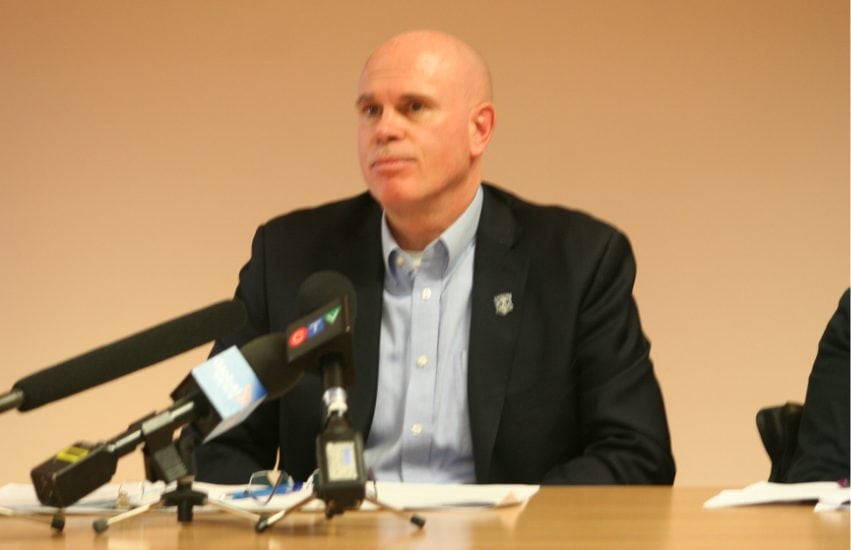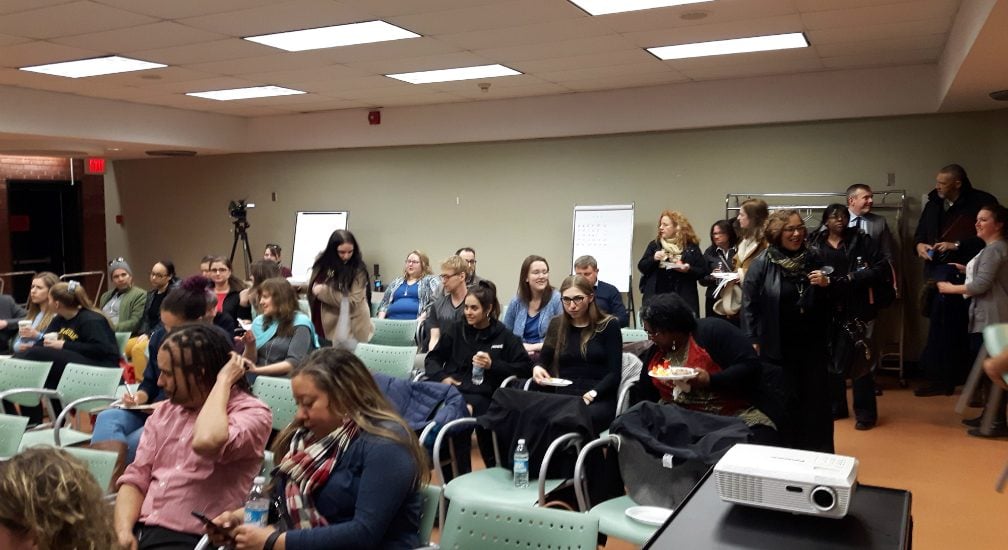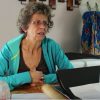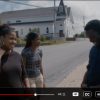KJIPUKTUK (Halifax) – Between 2005 and 2016 Halifax Regional Police collected 98,551 entity records, representing 36,652 unique individuals. As widely reported, a vastly disproportionate number of these records are about Black people.
A couple of things became increasingly clear during last night’s community meeting about carding and all it entails that took place at the North End Public Library. The meeting was organized by Dalhousie Legal Aid Service.
Black residents who attended the meeting don’t believe the police is on their side, and they don’t think the police is listening to their concerns.
And if anything, Halifax Regional Police chief Jean-Michel Blais went out of his way to confirm these suspicions.

This, by the way, is not a report on the many insightful contributions raised by the wonderful panel members during the evening. They talked about the damage done by street checks, the contexts of racism, history, and the trauma brought upon an entire community, and how to begin to repair that damage.
I apologize for that. Contrary to what this article seems to suggest, chief Blais was not the only panel member. But he was the only panel member with the power to make a difference and implement real changes in the short term. For me the chief’s inability or unwillingness to listen and respond to the questions that came from the audience became the more urgent story.
One question from the audience very early on set the pattern. Blais explained that there are constraints around what a police officer is allowed to ask a citizen. “For instance,” he said, there is a notion that police is able to seize a cell phone to see a video. We can’t seize anything without a warrant.”
“But that is exactly what they (police) tell you,” somebody responded.
Blais; “ I recognize that, and they (police) are wrong.”
Audience: “Well, they shouldn’t be telling people that they are allowed to do this. They are supposed to uphold the law. How can they tell you, yes, we are allowed?”
Blais. “This is something we are working on as part of our training. To let our people know you cannot seize it.”
Audience: “This has been going on for years. It’s not like it’s new.”
End of exchange….
Do police checks have effects?
Listening to Blais it felt as if any issues around policing the Black community were mostly resolved, if they ever existed in the first place.
Halifax is the only police force in Canada that not only reflects the cultural makeup of communities, we actually surpass it, he told the audience.
And some people, well, you will never convince them, Blais suggested.
“I also recognize that no amount of police training, targeted recruiting, policy developments, statistics or legal arguments can make a person believe they were treated fairly if they subjectively think that they can never be treated fairly,” he said

Later on, when asked whether in terms of carding the goals outweigh the effects, Blais didn’t seem to think there were any effects.
“There are certain inalienable rights we have in our society. One of them is to be free of being a victim of a crime. That is the main overriding concern we have as police,” Blais said.
“I need to know more about what we mean with ‘effects’,” he added. “I just wonder if the issues and results that are stated are not the result of street checks but are the results of other issues that are in our society today, poverty, abuse, income gaps that occurred, pollution, societal challenges and inequities that are out there, the lack of opportunities that certain segments have. Of course the whole issue around criminality.”
When Blais was asked to clarify that non-response and to acknowledge that police checks have effects, this was the response.
“Well, the acknowledgement is that there is crime, and I am talking about throughout all of HRM. There is crime there. And the approach we have developed over the years is intelligence-led policing, so it is based on the facts. Street checks is one of the tools that we use, we have other tools.”
Ferguson, Missouri
Some exchanges were just plain puzzling.
One audience member challenged Blais on the notion that “nothing can make a person believe they were treated fairly if they subjectively think that they can never be treated fairly,” that we mentioned earlier.
“I am insulted by your talk of perception, when the numbers released by your own force show they are attacking us, we are over-represented,” said the audience member. “People like me are being killed by police, and when you guys come up to us it is an act of terrorism.”
“I don’t think it is fair to even begin to answer, because you are asking about issues around politics, systemic racism that I don’t think I could answer right now,” Blais responded.
First off, you mention the aboriginals, of which I am a member. A Cree from Northern Ontario. They are underrepresented in our data, first off.
“Secondly, let me give you an example of a community where it is 1.3%. If you are in a community where it is 1.3 times getting checked more so than being white. Because here, according to our statistics it is three times. That community is Ferguson, Missouri. They have 63% African American, and 86% of checks are Blacks. That comes down to 1.3%.
“Also, you speak about police killings. Last year in Halifax we had twelve homicides. Seven of them were Black males. Are you saying that my police officers are responsible for these deaths?”
Complaining
Lynn Jones asked about the many administrative hoops you have to jump through to file a complaint and escalate it up through the hierarchy.
“I am just flabbergasted that someone who got subjected to something that happened on say Gottingen Street here would go through such a system to get justice. My question, do you feel that this is acceptable in terms of addressing this issue, and what alternative do you have for fixing this system?”
“This is a multi-layered challenge,” said Blais. “It needs to be discussed in terms of police, in terms of everything else that is around it. In terms of the actual process, there are people who do go ahead, who do lay complaints, and they are mediated up from the beginning. It’s not a perfect system. You live in a society and it is the system that we have chosen. It’s not perfect.”
Fear in the community
El Jones took issue with Blais’ mentioning of the shootings. “This is the time to talk about police,” said Jones.
“I want to raise that the fear of police also impacts Black women and their ability to call the police if they are in a violent situation. We know we can’t reach the police or we do damage within our community,” said Jones.
“I want to understand as well beyond police checks, what the impact is when black women are raped or in an abusive relationship or being beaten. We don’t have the option half the time of calling the police without risking endangering our community or fearing that the people who are then taken to prison and get unfair sentences.
I would also like to raise the mental health in our community and again the fear to call the police impacts our community. … How do we seek help in our community when that help will criminalize us?”
“This is not just a policing issue, this is a mental health issue, and not just within the Black community, but across all communities,” Blais said.
“This is an issue of opportunities, it is an issue of fear. For those of you who do not know, the issue of abuse, domestic abuse in all its forms, is the most under-reported complaint for many reasons, including the ones El has indicated before. A highly complex problem. Our three biggest challenges … are youth at risk, addictions and a big one, mental health. And it is not going to be solved by the police. It is going to be addressed by a complete societal change.”
On adopting Ontario’s constraints
Several questions focused on implementing constraints on police conduct during carding along the lines of new legislation adopted in Ontario.
In that province police must have a reason to stop a person, selection cannot be based on race or for being in high-crime area. When stopped, police has to say why they want to talk to you, and that you have the right to refuse. As well, police has to offer a receipt that refers to the officer’s ID, and that contains instructions on how to request a review.
“I have the actual Ontario regulations here (in a binder),” Blais responded. “The two questions I have is, what is the problem they are trying to solve, and two, does this really deal with the concerns of the effects that you have been talking about. Because I am not too sure that is the case.”
Somebody also asked about body cams.
“What is the problem we are trying to solve?,” Blais wondered again. “I am committed to give a report to the board of police commissioners, I figure that will probably be in the summer if not in the fall.
I am not committing to this, number one because of cost, and number two because everybody else has their own body-worn video as it is.”
If you can, please support the Nova Scotia Advocate so that it can continue to cover issues such as poverty, racism, exclusion, workers’ rights and the environment in Nova Scotia. A pay wall is not an option for us, since it would exclude many readers who don’t have any disposable income at all. We rely entirely on occasional one-time donors and a group of 25 or so dedicated monthly sustainers.




free of being a victim is a right? wow
Any chance of publishing the transcript and the recording of this event?